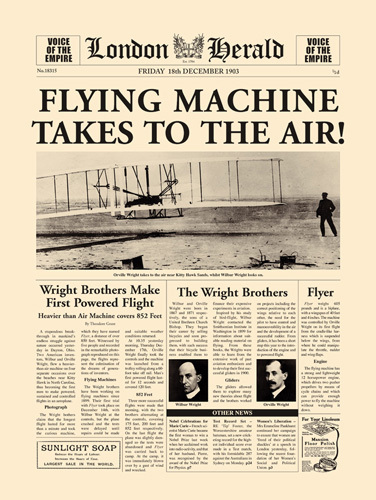In the early 1900’s everyone was trying to crack the puzzle that was controlled man flight. One particular individual was the poster child of the movement and expected to solve it first: Samuel Pierpont Langley. You’ve probably never head of him. We all know that the Wright Brothers are credited with inventing and flying the first successful airplane. So what exactly happened to Langley?
Of the many teams trying to solve this problem, Langley had the best of the best when it came to resources. He was funded by the War Department to develop a plane, so money wasn’t the issue. He knew all of the great minds at the time through his job at the Smithsonian and a seat at Harvard. He had a top notch team and the press followed him around everywhere. Everyone was rooting for Langley.
On the other hand, the Wright Brothers looked like and pretty much were, amateurs in comparison. Neither had gone to college, let alone finished high school. They had run a newspaper for a number of years, before opening a bicycle shop in 1892. They had little money, didn’t know the right people, and no one paid them much attention.
Yet, when they started studying the problems of human flight in 1897, they were sold. They believed human flight was possible and from that moment, decided to start experimenting themselves. When framed this way, not many would bet on the Wright Brothers to succeed, yet they had one intangible resources on their side: purpose.
If we all worked on the assumption that what is accepted as true is really true, there would be little hope for advance.Orville Wright
The key difference between the Wright Brothers and Samuel Pierpont Langley was the reasoning behind their endeavors. The Wright Brothers had become enamored with the thought of flight and were determined to discover it’s secrets. They believed in the idea of human flight so strongly that nothing would get in their way. They had a purpose.
On the other hand, Langley was driven by the fame and riches that would come from such an accomplishment. Langley had already gained prominence for his work in astronomy, but he desired to achieve a discovery on par with Alexander Graham Bell’s telephone or Thomas Edison’s light bulb. Already the root cause was an exterior desire not an internal belief.
He made two attempts in 1903, both ending in terrible failures that led to much ridicule and fanfare. Nine days after Langley’s second attempt, in Kitty Hawk, North Carolina, Wilbur and Orville Wright made the first successful controlled manned flight ever. The rest is history.
This stark difference behind the why of their work is what led the Wright Brothers to success. Their story shows us why purpose is so important for every endeavor. Here are 5 lessons we can takeaway from how the Wright Brothers used purpose to achieve their success.
1. They viewed failure as learning
The Wright Brothers flew far more times than on that all-important day in December of 1903. In truth, they flew as many as five times a day, making repairs in between each failure.
For the Wright Brothers, failure wasn’t a bad thing, it was simply another piece of the puzzle. It was an opportunity to learn and improve on their assumptions and approaches. Grounded by the purpose in their work, they were not deterred by any setback.
2. They didn’t care about their ‘disadvantages’
A funny tidbit is that the Wright Brothers were inspired to pursue human flight by earlier work done by Langley himself. The difference between their knowledge and backing is stark, but that didn’t stop the Wright Brothers from pursuing their goal.
Despite any perceived disadvantages, in reality, all they needed was their curiosity and belief in their mission. They weren’t the best funded or connected or loved, but they had an inner drive to succeed.
3. They weren’t distracted by anything
Langley had the recipe for success so to speak, but all the attention he received was also a distraction. The Wright Brothers were focused on the problem in front of them, not the media or their resources. They weren’t chasing fame or riches.
They self-funded their experiments through their bicycle shop and learned as they went. They weren’t focused on finding the best tools or methods or funding. They just did the work and kept moving along.
4. They made no excuses
We hear excuses all the time about why an endeavor failed. It was the wrong team. We didn’t have enough money. The market wasn’t ready. The Wright Brothers had none of those going for them and yet here we are.
Those that succeed face these same challenges and issues and adversity, but they work through them and find a way forward. Excuses often just give you a way out of examining what really went wrong. Despite the deck being stacked against them, they didn’t give up.
5. They did it for the right reasons
Most importantly, they were doing it for the right reasons: for the wonder and possibilities that would come from human controlled flight. That was their purpose and everything else was simply noise. The fame, the media, the money, the prestige, and so on.
These grounded beliefs are what kept them going despite numerous failures, whereas Langley was ready to fold after just two attempts.
There’s also something to be said about how such honest intentions seem to work out for the better. It is almost serendipitous in nature, how working for something beyond personal gain leads to more fruitful outcomes. When we look back to the early 1900’s, it becomes clear that the Wright Brothers are responsible for one of the greatest inventions in the world at that time. Bill Gates probably put it best when he said:
When we look back to the early 1900’s, it becomes clear that the Wright Brothers are responsible for one of the greatest inventions in the world at that time. Bill Gates probably put it best when he said:
The Wright Brothers created the single greatest cultural force since the invention of writing. The airplane became the first World Wide Web, bringing people, languages, ideas, and values together.
In the end, the power of flight was achieved by two brothers that were natural tinkerers. Two brothers who were uneducated and unknown to the world. Two brothers who simply fell in love with an idea and found purpose in pursuing it.
